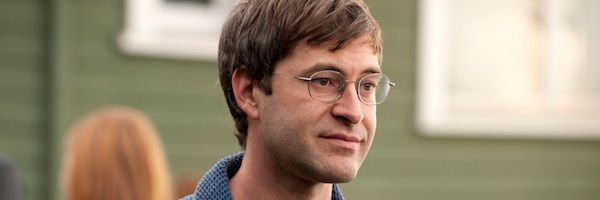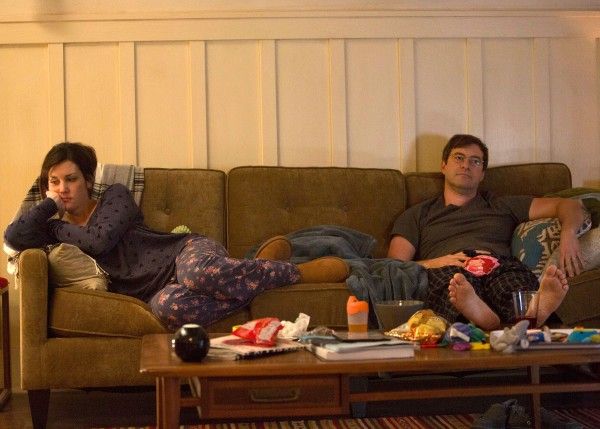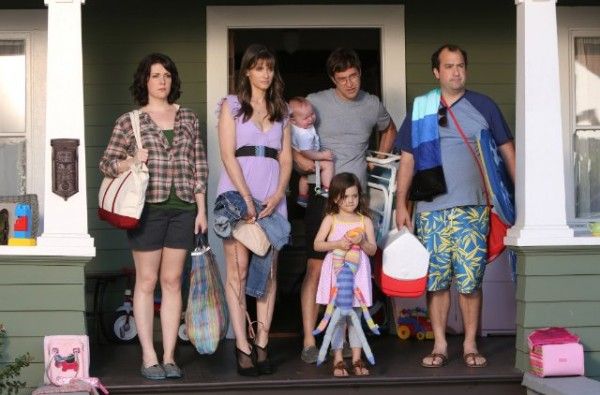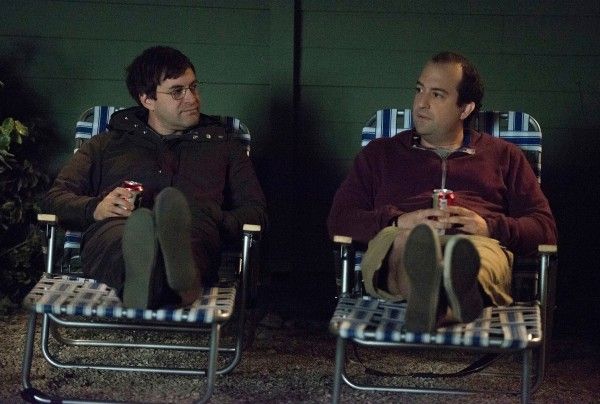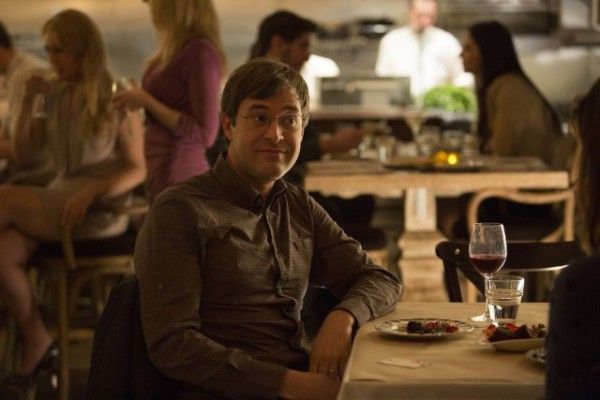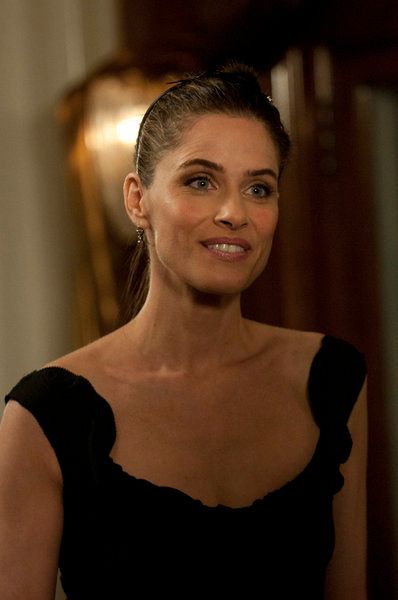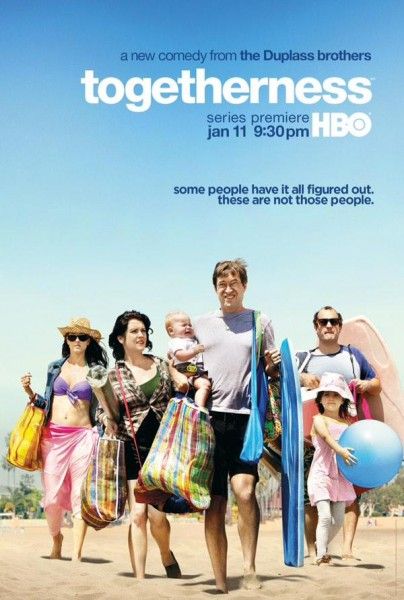Created by Jay and Mark Duplass and Steve Zissis, the HBO series Togetherness, which wraps up its first season run of eight episodes on March 8th and has already been picked up for a second season, is a real and honest look at a couple who are struggling to rekindle the spark in their relationship. Feeling the stresses of marriage and children, Brett (Mark Duplass) and Michelle (Melanie Lynskey) agree to let Brett’s friend Alex (Zissis) and Michelle’s sister, Tina (Amanda Peet), move in with them, but then immediately question that decision, as they all begin to question where they are in life and what their personal dreams truly are.
During this exclusive interview with Collider, show co-creator/executive producer/writer/director/actor Mark Duplass talked about why he and his brother decided to branch out to television, the challenges of doing a show that is so low-concept, why HBO was the perfect home for Togetherness, the evolution of the characters, why they wanted to do a half-hour show with only eight episodes, balancing the comedy with the drama, how their process of working together translated to TV, whether they might have more guest directors, and that they had already thought about possibilities for Season 2 and Season 3, while making Season 1.
Collider: This is your debut as a TV writing team. Was this something you’d been thinking about, and had you thought about any other possible ideas, before this one?
MARK DUPLASS: It was a very organic process. Jay and I normally just sit around and people watch, and we talk about things that are happening in our lives, or with people that we’ve met. That’s the soup from which our movies usually come from. The soup from this, in particular, felt very personal. It was very much based upon our lives as married parents, on the lives of all the parents that send their kids to the schools around us, our friends who are married, and our single friends who have not gotten traction yet, romantically or professionally, and their frustrations. It just seemed like we kept telling horrifying stories to each other and giving each other sympathy, but also laughing at and with each other. It felt bigger than a movie. It was really less about wanting to make a TV show, and more about wanting to make this story, and it felt too big. Luckily, we have had a long-standing friendship and flirtation with HBO. We’ve been trying to do things together for years, but it never really took. So, we brought this idea to them and built it together.
Was it challenging to sell HBO on something so low-concept?
DUPLASS: It’s not low-concept. It’s zero concept. That’s really what it is, and that’s part of what we love about it. It certain makes it hard to pitch. In a lot of ways, it’s a very simple adult show. It is about these four people living together, and it’s a nice pressure cooker that they’re in the same house. But the essence of the show, at the end of the day, is really about the desire that at least Jay and I have, and a lot of our friends have too, to be as close and as intimate as possible to our friends, our spouses, our children and our parents, and have the wonderfully rewarding relationship that that togetherness offers. But it’s so fucking fraught with peril and we need to eject from it, constantly. That’s the way we see the world, and that’s what we wanted to put into the show. The way we approach our work is to look for the epic smallness of interpersonal dynamics. By really digging into a sliver of life, we can find something in that, that we know very well, that hopefully can expand and everybody can feel something that they see themselves in.
So, the plan was always to do a show with HBO?
DUPLASS: The truth is that it really wasn’t planned. It wasn’t like we made a pitch and went, “We’ll go to HBO first.” I can’t really stress enough, how organic of a process it was. We started thinking that this could be a story that we could tell, and we had this long-standing relationship with HBO. We basically meet with them twice a year to say, “Is there something we could do together?” We would say, “We’re scared to make TV ‘cause it’s going to suck up our whole lives and we’re not ready yet.” During one of those meetings, this fell out of our mouths and they said, “Well, we’d love to talk about it,” so we just cobbled it together.
Did these characters go through an evolution, or were these always the characters that you wanted to tell this story?
DUPLASS: No, they did change. HBO was a big part of encouraging us to make four equal lead characters, which was really exciting to us. It helped having an outside force diagnose that for us. They were a big help, in the development process. The basics of the characters, as you know them now, were on paper, but once we cast Melanie [Lynskey] and Amanda [Peet], and saw the nature of our chemistry, we started to take that into account to write more specifically to the natural chemistry between the characters. We’ve tailor-made the storylines and the interactions to what happens organically with the people. And if we have anything to offer, as filmmakers and as TV makers now, it’s this ability to feel as close to a documentary as you can get in a narrative form. We’re obsessed with documentaries and the way that that feeling that anything could happen puts you on the edge of your seat. That’s what naturalism does to you. So, we were always trying to closely approximate that. That’s why we use a lot of improvisation, and we try to write for the actors and their strengths, so that it just comes easily.
Is that hard to do for yourself?
DUPLASS: It would be, if I didn’t have Jay. We really share the same brain, creatively. When I’m in a real emotional scene, I don’t have to worry. I really become much less of a director, in those moments, and rely on Jay to help me through them.
How did you decide on a half-hour shows versus an hour show?
DUPLASS: We really wanted this to not take over our lives, so that was the difference between an hour and a half-hour. And honestly, there’s a difference between 13, 10 or 8 episodes. We write and direct almost every episode of the show, so it takes a lot out of us. We like to be able to do other things, throughout the year. Jay acts in Transparent and I’m on The League, and we also produce a lot of independent films still. Keeping it the size of basically two movies felt digestible to us.
Because this is a half-hour show, it will get labeled as a comedy, but you address a number of darker issues. Is that balance tricky?
DUPLASS: It’s weird to figure out the labeling of it. I don’t want to sound like the guy who says, “Why do you have to label everything?,” but I’m about to say, “Why do you have to label everything?” It is fair to call it a comedy, in that the situations that present themselves, even though a lot of them are inherently dramatic, the characters themselves and the audiences find themselves giggling. It’s just so awkward and strange, and that’s the way that Jay and I see the world. Jay and I will go on a hike together, and he’ll tell me about something terrible that’s recently happening to him. It will inherently be pretty dramatic, but then we’ll just start laughing. I don’t know what it is. So, that’s why you could fairly call it a dramedy, if you wanted to. That’s a weird word. For us, there’s not much of a distinction between drama and comedy. It’s less about having some funny stuff and some dramatic stuff. Each moment has a little bit of it. When you watch this in a room with a bunch of people, it plays like a big comedy. But when you watch it at home, it plays a little more dramatically. We follow our instincts on what’s the most inspired thing that we want to see, particularly while we’re shooting a scene that could go funny or could go sad.
The relationship between Brett and Michelle is so interesting because you know they’re having problems, but you’re never told exactly what those problems are. Was that something you intentionally wanted to do?
DUPLASS: Yeah, we tried to show the things that you wouldn’t normally expect to see. That’s something that we definitely try to do. As this show is low-concept in many ways, and four people in a house is not very new, we try to offer you a new approach to that, inside of it.
You guys are veterans at working on movies together, but what were the differences in doing this project together?
DUPLASS: The way we shoot, the focus on actors, using improvisation, going for organic moments, and all of that stuff is the same. But, this feeling of throwing multiple balls up into the air and not having to close them out in 90 minutes created a much more open environment. It was like a creative key party. You could go home with anyone, and you didn’t know who it was going to be. It was really exciting to us that, if this one dynamic of this character was really interesting in an improvisation in Episode 2, we could grow that thing. We had room to maneuver, and we’ll have room to do more in Season 2. That’s a real big plus for us. There’s an argument to be made that the types of interpersonal dynamics that we like to explore are maybe better suited for the long form of television than for movies.
Was it also important to you that, if you were going to do something on TV, it was at a network that didn’t need you writing to commercial breaks or playing to sweeps?
DUPLASS: You got it. And it’s a slow-burning, growing show. I love our pilot. I really do. But there’s nothing high-concept about it that would make a major network say, “We’ve got it. Let’s dump a whole bunch of money and throw up billboards.” It’s really nice to have a place like HBO that believes in you. If it has to be slow and steady wins the race, then so be it.
When you direct these episodes, how does that work, and why did you decide not to direct one of the episodes?
DUPLASS: We wanted to see what it would be like to bring in another director onto the show and see if that was something that we’d want to explore. And Nicole [Holofcener] is a friend and she’s done a lot for HBO. It was almost more of an experiment for us, to see how it would feel and how it would go. It was great ‘cause she’s not only an amazing director, but she’s cool as shit. We learned a lot of good stuff from her. We’re very present because part of what we’re doing is improvising, so we’re changing the script, as we go. It was really fun doing that. We’re writer/directors at heart. We’re independent filmmakers at heart. We didn’t want to do a show where we’d put our name on it, direct the pilot, and then walk away. That’s just not who we are. We wanted to own this thing and have it be ours. We wanted to treat it with the respect that you’d treat a movie, which not all people do for TV. Every single moment of this show, to us, is ours. I’m acting in it, we’re EPs, and we’re there anyway.
Do you want to have more guest directors in Season 2?
DUPLASS: We’ve thought about it and we’re toying around with how that will go. In general, I would say that we really love writing and directing the show, and we’ll probably do the lion’s share.
What made you decide to cast Melanie Lynskey and Amanda Peet?
DUPLASS: When we do casting, it’s very different. As an actor, when you walk into a room to audition, you get five minutes with a casting director, who doesn’t even look at you, most of the time. And so, we’d do these half-hour to 45-minute sessions with me and Steve [Zissis], so that the actress could be reading with the actual person who’d be in the show and you’d know what it would be like. We read so many fantastic actresses, and so many of them had wonderful qualities. It all seemed so confusing. And then, Melanie walked into the room and, in 20 seconds, we were like, “That’s it. She is it.” It was a combination of her personality, her spirit, her brains, her attention to the human condition, and the nature of her chemistry with me and what happened between us, which was very well considered and careful and a little scary. It was just special, and we could all see it, right away. And then, with Amanda, the same thing happened. Her chemistry with Steve is so strong and specific. She was throwing him on the ground and dragging him across the floor, within two minutes of being in the room. It was like some weird re-booted version of Sam and Diane (from Cheers). You never would have expected that from those two. I would have expected those two to be the two at a party who got stuck in a corner, talking to each other, but they don’t know what to say because they’re so different. But, they just had a thing.
Because these relationships aren’t resolved by the end of the season, were you already thinking about what you wanted to explore next?
DUPLASS: Yeah. You’re generally not supposed to think about Season 2 until you get your green light, but we couldn’t stop ourselves because we’re in love with the show. We’ve thought a lot about it. We’ve even thought about Season 3. If we get the opportunity, the show is built to last and we’ll do a lot more.
You’ve talked about how you guys didn’t grow up in Hollywood and you weren’t surrounded by the industry. Do you think that’s worked to your advantage, because you approach things so differently?
DUPLASS: I think so. It’s certainly the only way I know, so I can’t say whether it’s an advantage or disadvantage. But, I’m very happy where I ended up. We were forced to be in this place of complete ignorance about how the industry works, so we just started making things on our own. There’s a very handmade, arts-and-crafts process to everything we do. While we were embarrassed about that, and while I used to write my scripts in a Microsoft Word document and submit budgets on a napkin to people, we’ve also found that people are taken aback by it and they’re surprised by how we do it like these two little cavemen. I still function that way, in a lot of ways. We’ve done really well when we’ve functioned from our instincts and our guts and we put our brains away, and we try to follow that still. It’s hard to do in this business. That’s not fully true, what I said, because we are aware of the industry and the inner workings of it. There’s a reason we’re at HBO right now. There is a boon of incredible content being made there, and in cable television. There’s a harder time making this kind of stuff at the mini-major studios in the film world. That’s dying, a little bit. So, there is some consciousness, on our part, in going to a place where we would be really supported.
You had to adapt your filmmaking process to the TV process, but will the TV process change how you approach your films?
DUPLASS: That’s a good question. We’re still very much involved in filmmaking. We directed the equivalent of what is two movies for HBO, and we still produce a lot of movies. Making movies that are really cheap and that can be owned and that you maintain your control of is really exciting. But, I don’t have to do that in TV. I can exist in the middle class and still have creative control because it’s like early ‘70s Hollywood filmmaking in TV right now.
Togetherness airs on Sunday nights on HBO, with the season finale airing on March 8th.

